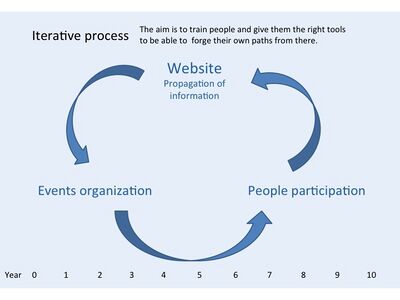LED 2016 Group D Democratic Change Process: Difference between revisions
| Line 38: | Line 38: | ||
Influences: | Influences: | ||
'''Robert Chambers''': founding father of participatory development in the 1990s, developed the idea of putting people first ahead of expert opinion, a concept that has been refined, redefined and sometimes coopted but the guiding principle is still important. | '''Robert Chambers''': founding father of participatory development in the 1990s, developed the idea of putting people first ahead of expert opinion, a concept that has been refined, redefined and sometimes coopted but the guiding principle is still important. | ||
Revision as of 08:17, 19 June 2016
The process of planning can be very complex and can also include a high probability of failures. In any case, planners should, to prevent a breakdown, find a democratic way of designing. Planning should also include the value of local knowledge. This inclusion improves the legitimacy of the process. In any case, forward looking planning increases the chance of obtaining a successful, consensus result. Another important aspect that any planner should be aware of is that good policy making can be very influential. Therefore the art of planning processes lies in finding effective ways for stakeholders to participate. Participation and experience in the landscape planning process can be helpful for learning as is the inclusion of stakeholder contributions to the analytical framework and results
Power Map
- Power Map
Power Map: Tourism will affect many aspects of village life and hence there are many stakeholders. These stakeholders, however, will have varying interests in tourism and different degrees of impact on it. Some stakeholders will need to be included early on to counteract any negative input at a later stage, thus an awareness of the power dynamics within the village is vitally important.
Change Process
- Change Process
Change Process: Raising awareness of the benefits of the website on village life will be an ongoing process over many years. Attendance at various markets and village events will help to keep the website in the forefront of people's minds. The workshop will help to develop the website to bring the maximum benefit to the community and ensure their input and needs are properly incorporated.
Long-term change process: It is envisaged that there is an iterative cycle of awareness raising followed by workshops to ensure that the website remains connected to the communities needs. These workshops would have to be continued in a fun, interesting and creative way to maintain enthusiasm and to attract new people to participate.
Concluding reflections
- Reflections: Potentials and limitations of the website?
File:Group D-Slide07.jpg Limitations are: 1. Those in power may have an interest are to maintain the status quo and will therefore try to either squash the initiative or co-opt the initiative for their own benefit. 2. Elite capture by those with a better education or more money to harness resources better for themselves, either inadvertently or deliberately (elites who have the interests of others at heart can facilitate such initiatives, but can also unwittingly put others off). 3. Ensuring that those with the least voice are also represented and heard. 4. Irrelvence: Some initiatives can be seen as irrelevant unless it puts concrete resources into people’s hands and ensures that workshops meet the needs of people in the community and enable them to come together to work through projects. 5. Internet connectivity could be an issue, especially amongst the older generation, but Latvia is one of the most connected in Europe and mobile internet is viable.
Potentials are: 1.The website fulfils a need for bringing together people who live in the area or still have strong contacts with the area to work towards a more positive future. 2. It encourages participation without having to travel to a certain place each day or week – which can be time consuming on inadequate roads and lack of transport. 3. To develop synergies and unexpected spin offs with both local and locally connected persons when they realise they have similar ideas or can connect to ideas they feel would be helpful.
- Which practices or practitioners have framed your work, including a brief narrative of the potential gaps you have filled in our knowledge as designers and planners of participation.
Influences:
Robert Chambers: founding father of participatory development in the 1990s, developed the idea of putting people first ahead of expert opinion, a concept that has been refined, redefined and sometimes coopted but the guiding principle is still important.
John Gaventa: Cautions how the powerful can dominate the dialogue, suppressing local knowledge, something to be aware of in post-Soviet Latvia where the actions of the Soviet authorities hampers people’s skills to participate today.
Frankfurt Gestalten: a website for promoting community networks, publicising practical projects for people to be involved in and for reference
Planning projects should not be one off events but aimed at skill building with steps taken to aid a community’s ability to take control of their own landscapes. Space for synergies should be created and planners should be prepared for ideas to take off in directions they do not expect and be prepared to accept that.


